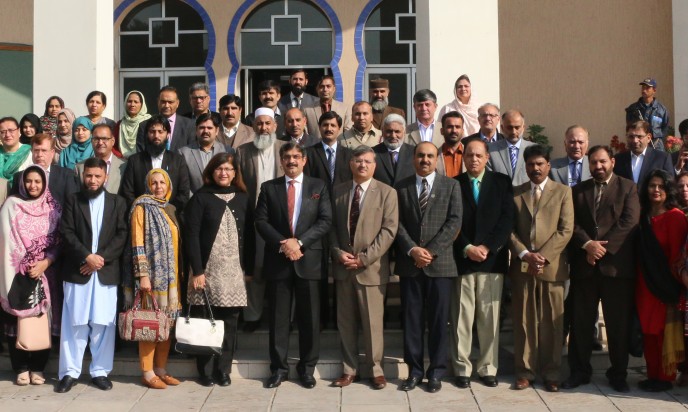

Learning together through life: Building capacity in family literacy
opening_ceremony_group_photo.jpg

The UNESCO Institute for Lifelong Learning (UIL), together with national and local partners in selected countries in Africa and South Asia, has completed a series of capacity-building workshops on family literacy and learning. Literacy stakeholders from Benin, Burkina Faso, Ethiopia, the Gambia, Guinea-Bissau, Guinéa, Mali, Niger, Senegal and Pakistan participated in the subregional and national workshops throughout 2019.
The workshops were offered within the framework of UIL’s Family and Intergenerational Literacy and Learning (FILL) project, sponsored by the Foreign Office of the Federal Republic of Germany. The project explores family literacy from a humanistic literacy and lifelong learning perspective, building on everyday family practices and resources developed within communities. The overarching aim is to support participating countries in achieving Sustainable Development Goal 4 on education.
The programme involved workshops on family and intergenerational literacy and learning in West Africa (with government and civil society representatives from Benin, Burkina Faso, Mali, Niger, Senegal, Guinea-Bissau and Guinéa), Ethiopia and the Gambia, and Pakistan (with government and civil society representatives from Capital territory and 5 provincial areas). The West African workshop, organized by UIL in Dakar, Senegal, in partnership with PAMOJA West Africa, guided participants in understanding the foundations of family literacy and in developing plans and strategies to implement them.

“My approach to learning is not at all prescriptive, but rather a process of construction of knowledge based on the experiences and strengths of the participants. I try to create an atmosphere of equality between the participants and myself - we share knowledge, and we build something together. I think such an approach is particularly useful given that participants come from seven different countries, each with their unique social, cultural and political context.”
Mr Yvon Laberge, facilitator of the Dakar workshop
The training in Ethiopia and the Gambia took the form of facilitator training workshops, which were adapted to cater to the specific needs and context of participants. The power of relationships and sense of community are highly valued assets for promoting family literacy initiatives in the Gambia. Recognizing this element, the facilitator encouraged participants to work together as a community, and discuss using authentic learning materials that reflected the daily lived experiences of The Gambian people. In Ethiopia, family and intergenerational literacy and learning was subsequently integrated into education sector priorities through partnerships with three local universities in Ethiopia.
A National workshop took place in Pakistan in December 2019, in partnership with Allama Iqbal Open University (AIOU), Islamabad. Pakistan is one of the countries of the Global Alliance for Literacy with wide geographic and gender disparities within its less than 60% national literacy rate. This situation demands integrated approaches to overcoming the persistent challenges of disadvantage, inequality and exclusion. The multilingual context of communities in need of improvement in literacy skills is an important dimension, which was a concerted theme in the workshop. The workshop programme guided participants in developing a better understanding of the design and implementation strategies of family and intergenerational literacy and learning programmes, and on how to monitor and evaluate these programmes. Some 80 participants from five provinces attended, including government officials and representatives of civil society and local organizations working or intending to work in the field.
Ms Rakhat Zholdoshalieva, who leads the family literacy programme at UIL, said: ‘Family and intergenerational literacy and learning is an evolving concept that treats each family member as a lifelong learner and holds the potential to engage family members in improving literacy skills. Through the regional and national workshops, capacity was strengthened among a diverse set of stakeholders to adapt this approach within their contextual and cultural frames. Partners and practitioners also contributed to expanding the reservoir of knowledge, resources and best practices. Next steps include further strengthening the knowledge base by understanding the role of indigenous knowledge, learning practices and literacy.’
Resources
Learning Together Across Generations: Guidelines for Family Literacy and Learning Programmes (the UIL Guidelines), and a policy brief, Engaging Families in Literacy and Learning, were developed as two key open access resources for the promotion and implementation of family and intergenerational literacy programmes.










